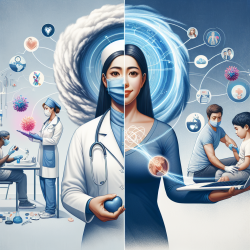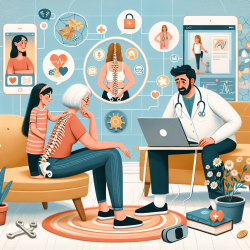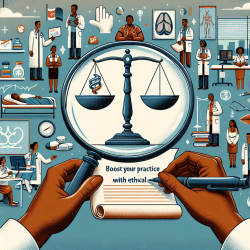Introduction
The COVID-19 pandemic has been a catalyst for unprecedented changes across various sectors, including healthcare. A recent critical review titled "A Critical Review from the Perspective of 2 Years Thereafter of the Effectiveness of Revolutionary Changes in a Gastroenterology Division at a Medical School Teaching Hospital due to the Coronavirus Disease-2019 Pandemic" offers valuable insights into the adaptations made in a gastroenterology division. These changes, while specific to gastroenterology, provide a framework that can be applied across different healthcare settings, including speech-language pathology and online therapy services.
Key Findings from the Review
The review highlighted several revolutionary changes that were implemented to address the challenges posed by the pandemic:
- Transition to Virtual Platforms: The shift from in-person to virtual lectures, meetings, and conferences was a significant change. This transition not only ensured continuity in education and training but also minimized the risk of infection transmission.
- Reorganization of Clinical Services: The division prioritized COVID-19 patient care by reallocating resources and staff. This included temporarily assigning GI fellows to supervise COVID-19 wards and postponing elective procedures.
- Economic and Staffing Adjustments: The pandemic led to financial challenges, resulting in cost-cutting measures such as staff furloughs and terminations. Despite these challenges, the division maintained essential services and supported staff through regular check-ins to monitor stress levels.
Implications for Practitioners
For practitioners in fields such as speech-language pathology, the strategies outlined in the review can serve as a guide for improving service delivery during and beyond the pandemic:
- Embrace Technology: The successful transition to virtual platforms in the gastroenterology division underscores the importance of leveraging technology. Speech-language pathologists can enhance their practice by incorporating teletherapy sessions, which offer flexibility and accessibility to clients.
- Prioritize Client Needs: Just as the gastroenterology division prioritized COVID-19 care, practitioners should focus on addressing the most pressing needs of their clients. This may involve modifying treatment plans or offering additional support to families navigating the challenges of remote learning.
- Monitor and Support Staff Well-being: Regular check-ins and support systems for staff can help mitigate stress and burnout. Practitioners should consider implementing similar strategies to ensure their teams remain resilient and effective.
Encouraging Further Research
While the review provides a comprehensive analysis of the changes implemented in the gastroenterology division, there is a need for further research to explore the long-term impact of these adaptations. Practitioners are encouraged to engage in research activities that examine the effectiveness of virtual therapy models, client outcomes, and staff well-being in the context of ongoing and future challenges.
To read the original research paper, please follow this link: A Critical Review from the Perspective of 2 Years Thereafter of the Effectiveness of Revolutionary Changes in a Gastroenterology Division at a Medical School Teaching Hospital due to the Coronavirus Disease-2019 Pandemic.










